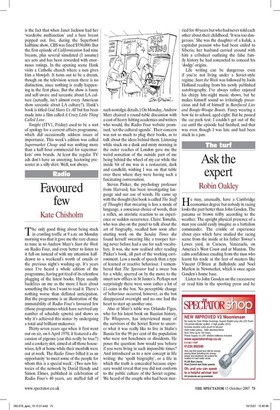Favoured few
Kate Chisholm The only good thing about being stuck in crawling traffic at 9 a.m. on Monday morning was that it gave me the rare chance to tune in to Andrew Marr's Start the Week on Radio Four, and even better to listen to it full-on instead of with my attention halfdrawn to a weekend's worth of emails or the previous night's washing-up. It's years since I've heard a whole edition of the programme, having got tired of its relentless plugging of the latest books. Hype usually backfires on me as the more I hear about something the less I want to read it. There's nothing worse than deflated anticipation. But the programme is an illustration of the immutability of Radio Four's favoured few (those programmes which have survived any number of schedule upsets) and shows us why it's achieved this status: by undergoing a total and brilliant makeover.
Thirty-seven years ago when it first went out on air, on 6 April 1970, it featured a discussion of pigeons (can this really be true?) and a cookery slot, aimed at all those housewives, left at home while their menfolk were out at work. The Radio Times billed it as an opportunity 'to meet some of the people for whom this is a special week'. (Two new histories of the network by David Hendy and Simon Elmes, published in celebration of Radio Four's 40 years, are stuffed full of such nostalgic details.) On Monday, Andrew Marr chaired a round-table discussion with a cast of heavy-hitting academics and writers who would, the Radio Four website promised, 'set the cultural agenda'. Their concern was not so much to plug their books, as to talk about the ideas behind them. Listening while stuck on a dank and misty morning in the outer reaches of London gave me the weird sensation of the outside part of me being behind the wheel of my car while the inside bit of me was in a restaurant, dark and candlelit, wishing I was on that table over there where they were having such a fascinating conversation.
Steven Pinker, the psychology professor from Harvard, has been investigating language and our use of words. He came up with the thought (his book is called The Stuff of Thought) that swearing is less a mode of language, a conscious choice of words, than a reflex, an atavistic reaction to an experience or sudden occurrence. Claire Tomalin, who was also on the panel to talk about the art of biography, recalled how soon after starting work on the Sunday Times she found herself swearing like a trooper having never before had a use for such vocabulary. It was, she now realised after reading Pinker's book, all part of the working environment. Less a mode of speech than a type of learned or reactive behaviour. I remembered that The Spectator had a swear box for a while, spurred on by the move to the smart new offices in St James's. Perhaps not surprisingly there were soon rather a lot of £1 coins in the box. No perceptible change of behaviour occurred, however, as the box disappeared overnight and no one had the heart to start up another one.
Also at Marr's table was Orlando Figes, who for his latest book on Russian history, The Whisperers, has interviewed many of the survivors of the Soviet Terror to uncover what it was really like to live in Stalin's Russia for the 99 per cent of the population who were not henchmen or dissidents. He poses the question: how would you behave if you were living in such impossible times? And introduced us to a new concept in life writing: the 'spoilt biography', or a life in which the truth is concealed because exposure would reveal that you did not conform to the public culture of the Soviet regime. We heard of the couple who had been married for 40 years but who had never told each other about their childhood. 'It was too dangerous.' She was the daughter of a kulak, a capitalist peasant who had been exiled to Siberia; her husband carried around with him a cribsheet outlining the false family history he had concocted to conceal his 'dodgy' origins.
Life writing can be dangerous even if you're not living under a Soviet-style regime. Start the Week was followed by Jools Holland reading from his newly published autobiography. I've always rather enjoyed his chirpy late-night music shows, but he makes himself sound so irritatingly precocious and full of himself in Barefaced Lies and Boogie-Woogie Boasts. Fancy wearing a bow tie to school, aged eight. But he passed the car-park test: I couldn't get out of the car until the episode had finished, and that was even though I was late and had been stuck in a jam.



































































 Previous page
Previous page